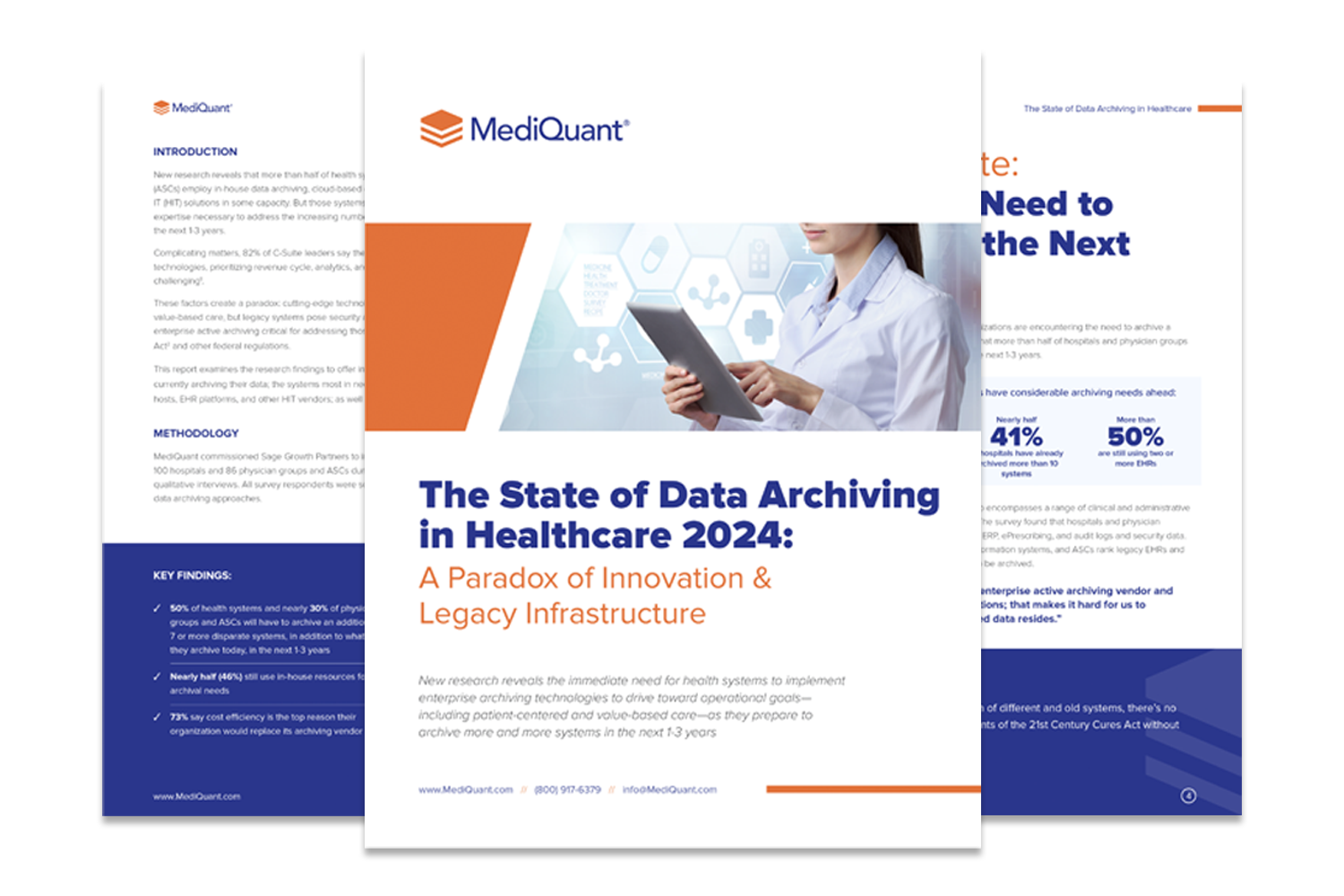MaineHealth needed an archiving solution that allowed it to store legacy health system data across 70 different legacy applications spread out over 10 hospitals. MediQuant provided its user-friendly archiving system DataArk, which ensures record retention and an intuitive user experience through an easy-to-use use platform.
Profile
Organizations that are committed to the health and well-being of the communities it serves. As the largest healthcare organization in Maine and a leading healthcare provider serving northern New Hampshire, MaineHealth is recognized as one of the nation’s top integrated healthcare delivery networks.
The Challenge
MaineHealth needed to decommission 70 legacy applications spread throughout the health care system. Each of the system’s 10 hospitals operated with their own programs, including EHR and various financial applications. MaineHealth required a common solution that would enable it to consistently and accurately archive data.
“As we started working on this project, it became clear that we had data integrity issues,” said Stephanie LeMay, Program Manager, Enterprise Data Archiving, at MaineHealth. “Data was spread out across a variety of applications, and we didn’t really understand the data very well. Many of our internal experts on the specific applications were no longer with the company, which created a knowledge gap.”
The health system also struggled with data purging. Many of the hospitals used MEDITECH’s EHR software, and there was confusion about the system’s purging feature. As the company began the archiving project, they discovered there wasn’t documentation and scripting around much of that purged data. “Users can’t really see the gaps, and without internal experts, there were challenges around retaining relevant data and archiving appropriately,” said LeMay.
MediQuant is unique in that it reviews data using a process that involves nearly 450 scripts. The process identifies any variances so that issues can be fixed prior to migrating the system.
As MediQuant learned more about the health system’s challenges, additional issues surfaced that required attention. For example, scanning and archiving was configured, and the health system’s EHR system was running reports to the archives. Even though the data wasn’t available in MEDITECH, it could still be pulled from the archive. MediQuant did a quick scope change and is now doing front-end report generation.
The Solution
MaineHealth wanted all data across the health system’s 10 hospitals to be archived with a consistent and easily accessed solution. MediQuant provided a solution that included a simplified platform to consolidate dispersed data into a single, common framework with one interface and one access point. As a result, the health system could take all data from legacy systems and create a single source of legacy data to live out its life.
“We spoke with other vendors, and many were unable to work through our unique challenges,” said LeMay. “Our Health Information Management Director was impressed with DataArk, which serves as a single access point where many different legacy applications can be consolidated to simplify the IT landscape.”
DataArk provided the health system with an “active archive.” This type of archive provides users with real-time access to view data and run reports while continuously working on tasks. Epic’s auto invoke feature enables physicians to access historical patient data, which allowed them to make informed decisions with a single click within their Epic system. This feature was critical, as it eliminated costly expenses associated with maintaining support for old, decommissioned legacy systems, as well as the need to physically search for old records—saving time and money.
Another hurdle that MaineHealth struggled with was harnessing internal resources around data validation. “The people who are still at the company and understand these applications have moved up,” said LeMay. “They’re now serving as CFOs and controllers or in other high-level positions. With so many competing priorities, asking them to do data validation was a challenge.”
LeMay explains that MediQuant was there for them every step of the way, navigating whatever challenges came up. “Over and over again, we are getting feedback that the new system is so easy to use compared to older systems, yet it doesn’t feel new because it’s so intuitive,” said LeMay.
“We spoke with other vendors, and many were unable to work through our unique challenges. Our Health Information Management Director was impressed with DataArk, which serves as a single access point where many different legacy applications can be consolidated to simplify the IT landscape.”
The Results
One of the major benefits is that HIM staff have a centralized location for data and can easily pull required data from a single system. Centralized data also means that calculating ROI is much easier and more accurate. “Previously, staff had to manually pull records across systems, and the risk of missing an important piece of data is real,” said LeMay. “It was also possible that medical staff was missing necessary insights about prior patient visits.”
“For example, an ER doctor couldn’t always get the answers they might need outside of normal business hours,” said LeMay. “If a trauma patient arrives in the ER in the middle of the night, the treating physician couldn’t access full historical data. Now, DataArk puts historical data in the hands of medical staff who need it real-time, 24/7, and that’s a huge shift, with a real impact on patient care.” DataArk’s archive function gives medical staff full accessibility and the ability to modify patient records during the decommissioning process, allowing physicians to provide optimal, timely and cost-effective care throughout the entire transition without disruption.
“Archiving across 70 different applications is a major undertaking, and we’ll be working on this program into the future. Once we reach our destination, this will be a huge win and will help our medical and HIM staffs do their jobs better,” said LeMay.


